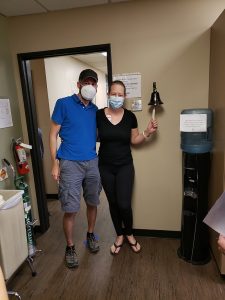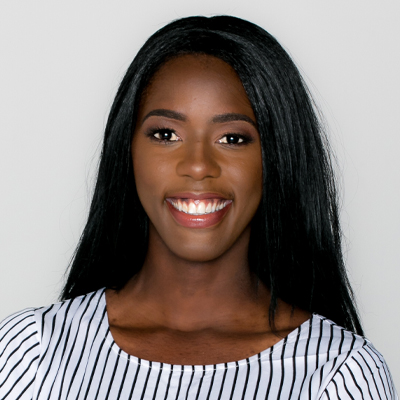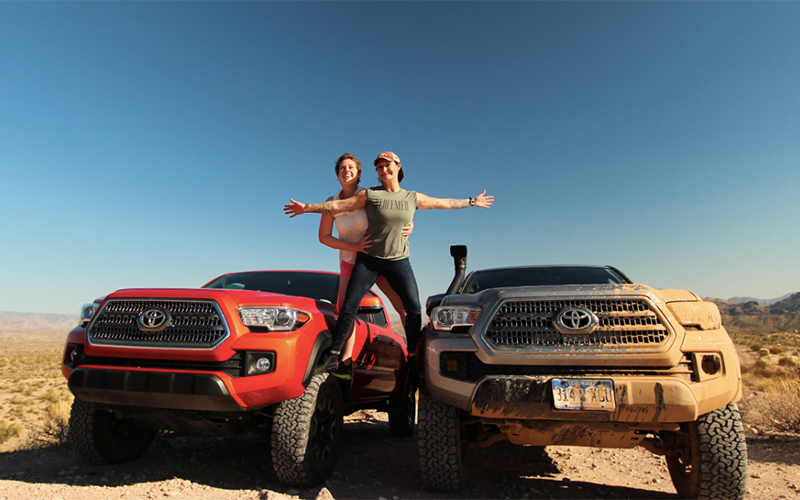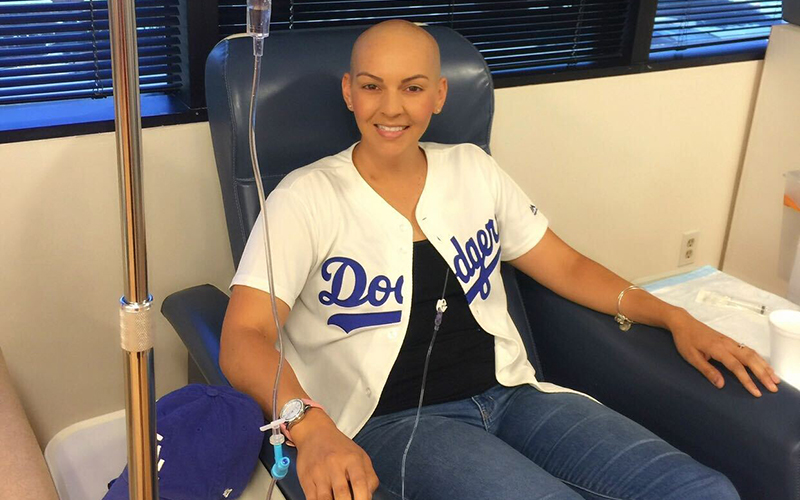PHOENIX – Jessica Gade frequently traveled around the world and spent time outdoors, but when reality limited her to just two places in 2020 – her Tempe home and her oncologist’s office – it gave her the push she needed to pursue her dreams now.
“I just keep going back to that day,” said Gade, a physical therapist at HonorHealth. “I was crying in the oncologist office almost a year ago not knowing what kind of cancer. I didn’t know if I was going to die or not. It was one of the most terrifying experiences for me.”
It was that nerve-wracking experience that jolted her to tackle one daunting challenge: the Rebelle Rally.
The event is an eight-day all-women’s rally traversing over 1,200 through California and Nevada in an off-road stock vehicle, without a GPS or cell phone.
The vehicles are not race cars. Instead, they are everyday cars, like 4x4s, trucks, jeeps or SUVs. A qualifying rule is that all vehicles must be street legal with minor modifications allowed, and teams must maintain posted speeds.
During the rally, 50 teams will search for hidden colored checkpoints along the route. They must find the green checkpoints marked on the map, which are the easiest. The smaller blue flags are harder because they’re unmarked. The black flags are the hardest because they are not marked on the map or on the course.
In its sixth year, the 2021 rally is scheduled for Oct. 7-16. Participants won’t know the actual course until the day before.
“My goal is to get all the blue and green checkpoints every day,” Gade said. “I want to at least finish that, even if we don’t get to the black checkpoints. If you don’t get to those you lose points.”
Although there is an award for the teams who find the most checkpoints, it’s not considered a race – rather a rally based on precision, “the elements of headings, hidden checkpoints, and distance using maps, compass, and a roadbook.”
More than the race itself, founder Emily Miller said women who have done this rally leave with much more.
“We hear this a lot. If I can do the Rebelle, I can do anything,” Miller said. “I want them to walk away and believe that.
“I also want women to define failure differently. You’re going to fail in the Rebelle every day.”
Gade has competed in women’s-only events before and draws inspiration from them. She said it’s a safe place for women to prove they can do things that men can do, which can be empowering.
That type of strength and courage was what Gade needed to get through her cancer diagnosis in 2020.
Gade, a fairly active individual with no family history of cancer, was shocked to learn she had Hodgkin’s lymphoma. Although she had a four-month lingering cough, doctors thought it was a viral infection. Even after multiple blood work and tests for infection, they all came back negative.
As time passed, she started having difficulty breathing and chest pain that prevented her from doing light activities.
“I just kept knowing like something wasn’t right,” she said. “When you’re into any kind of athletics, you know immediately when something isn’t right, and I just knew.”
In early 2020, a biopsy confirmed she had Hodgkin’s lymphoma, and in just two months the tumor tripled in size.
It is a cancer of the lymphatic system, which contributes to immune system health. The cells in the lymphatic system grow at an abnormal rate and can spread to other areas of the body.

Gade’s cancer diagnosis was a scare, but her husband, Lasse, and the knowledge of the upcoming Rebelle Rally were a source of encouragement. (Photo courtesy of HonorHealth)
Hodgkin’s lymphoma has four stages. Stage II is when the cancer is in two lymph node regions or the cancer has invaded one organ and the nearby lymph nodes. But the cancer is still limited to a section of the body either above or below the diaphragm.
“Mine was still above the diaphragm,” Gade said. “I just had my main tumor like at my sternum, which is why I was choking. It was pressing on my trachea, my heart, and my lungs.”
From May to October 2020, Gade completed rounds of chemotherapy. In November, she completed radiation.
She described chemotherapy as a scary and lonely time, especially with a backdrop of the coronavirus pandemic.
“It was actually quite depressing,” she said. “I don’t want to say that was more depressing than having cancer, because chemo really sucks. Not being able to go for a hike or do stuff was really sad.”
Melissa Sullinger, who is a nurse and was Gade’s “chemo buddy,” said going through treatment together helped the process to not feel so lonely.
“I will never forget the first chemo session. We were next to each other, and the whole time we were in the chair for infusion, Jessica had me laughing,” she said. “You would have not thought we were there for chemotherapy.”
Given the secondary effects of chemo and not working for nine months, Gade has challenges, at times, balancing life and training. To have the rally to look forward to helps her get through rough days.
“At the end you just have to keep hanging on, one foot at a time, one day at a time and plan to do something fun once (chemotherapy is) over,” Gade said.
Her husband, Lasse, has been another source of encouragement but also reminds her to take breaks.
“It’s a buttload of money, but I told her you should do it,” Lasse said. “She’s been eager to learn more and do more driving when it comes to offroading, especially when we go on trips.”
The decision to do the rally came after Jessica found a posting from a woman needing a partner in a Rebelle prep group.
Although Jessica lives in Arizona, and her rally partner, Tasha Booth, is in Colorado, they stay connected with FaceTime chats.
Booth says she knew they would be a team when they had the same taste for the team name, Tyrannosaurus Wrecks.
Booth will be the main driver and Gade will be the navigator, but each must learn both skills so they can switch places when the other needs a break.
Booth is no stranger to driving large units, having been in the military for 17 years. However, she’s completing driving training to learn how to navigate different terrains, like sand dunes.
Gade trains on her off days, which include online training, reviewing maps and using a compass to reach her destinations. On weekends, she and husband take weekend-long off-road trips to get acclimated to the elements she’ll face during the rally.
While there will be stations for car assistance, both must know how to inflate and deflate the tires, check the filters, and constantly check for minor maintenance issues.
Aside from the technical elements, both say communication and staying mentally focused will be key in finding the many checkpoints during long race days.
Gade said fatigue continues to be a challenge, but doctors say it could take closer to a year or more to feel normal again.
However, Gade isn’t letting a pandemic, money or fatigue get her down.
“The entry team cost alone is $13,000 and the training classes are super expensive,” Gade said. “Still have to pay for fuel at the event, GPS trackers, flags for the sand dunes, fire extinguishers, spill cats, and it adds up.”
To raise money, Gade has worked extra shifts and is constantly reaching out to sponsors to assist with costs. And so far, they have a few sponsors for helmets and wipes, but still need more assistance.
“How crappy would that be to not be able to do something that you’ve always wanted to do,” she said. “OK, it’s really expensive, and it’s going to cost me $10,000 if I can’t get things sponsored.
“But at the end of the day, what am I going to do with that (money) if I die.”
Both realize the importance of good communication throughout to accomplish their goal of finishing in the top 10.
“Everyone has an idea of what that (communication) looks like for them,” Booth said. “Trying to figure out how to bring those two pieces will be the hardest part.”
Their sights may be high for a rookie team, but Gade is excited to accomplish a long-time bucket list goal.
“I just want to prove that I can do it, you know,” she said. “We’ve all used paper maps at some point. But, I’ve never plotted a course with a compass and a plotter on a piece of paper map and that’s the only form of directions you’re going to have.”
The constant challenge to train for the race and manage fatigue is there, but Gade is grateful for a curable cancer that allows her to keep chasing her goals.



